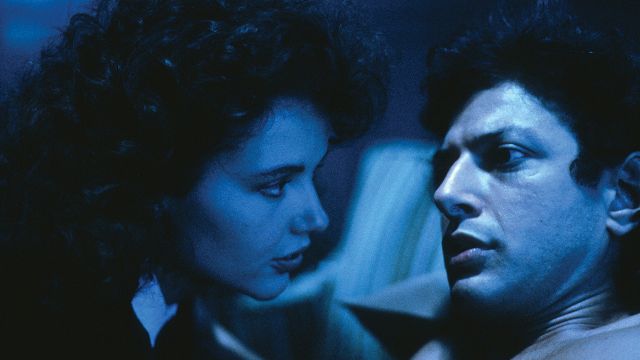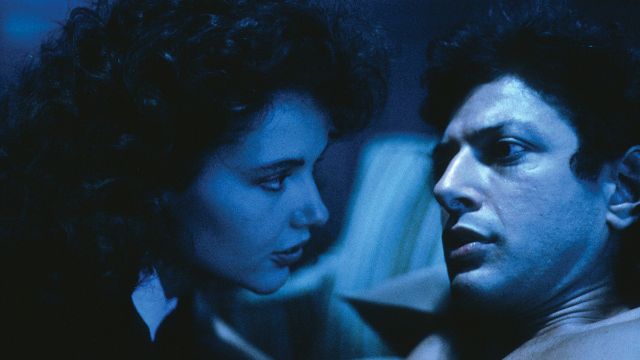
A typical superhero origin is easy to recognize. The central character is often a scientist of some kind, working on an experiment they hope will change the world. They tend to feel as if they are on the cusp of something great. So excited about the potential ramifications of their science project, they get rash. The protagonist becomes cavalier with their own corporeal form, too engaged in their work. That’s when it happens: some small mistake alters their life forever. Bruce Banner becomes the Incredible Hulk. Jon Osterman becomes Dr. Manhattan. This description of events also applies to Seth Brundle, the protagonist of David Cronenberg’s 1986 body-horror masterpiece The Fly.
Brundle (Jeff Goldblum) has nearly perfected the science of teleportation when he meets a female journalist, Veronica Quaife (Geena Davis) at a science convention. Looking to further her career, she embeds herself with him in his lab, observing his process as he nears the completion of his experiment. The two become romantically involved — which leads Brundle to a breakthrough. Excited that it appears he has successfully teleported a living organism, he — after a few drinks — climbs into the telepod himself. But a fly climbs into the pod with him, and the two beings teleport to the second pod together, combining on a molecular level.
At first, Brundle does not notice any changes, but gradually he gains strength, stamina, and energy. He hypothesizes these new abilities to simply be a side effect of the teleportation. Soon, however, his mind and body begin to change too. The idea of this critical change is really only occasionally hinted at in most mass-market superhero films. In The Fly, that subtext is made text. In a philosophical context, superhuman abilities are not just something gained, like a cosmetic addition to a vehicle. They would fundamentally change one’s sense of self as they change their genetic makeup. Brundle more or less says outright that, while at first he thought he had become more than human, he eventually realized that he is in fact something entirely different. Something new.
It is interesting to see the formula of a superhero film tweaked ever so slightly to become something almost entirely different. The Fly is a superhero origin story without the hero part. Brundlefly — which Seth eventually starts calling himself — never rescues anyone from danger. He never stops a crime. In fact a certain point, he becomes incapable of experiencing any sort of human morality — because he is no longer human. The burden of being the only one of his kind is too painful. In a final moment of clarity, Brundlefly admits defeat and realizes he should not exist. He begs Veronica to put an end to his misery and she complies, tearfully.
I do not intend to imply that superhero films made in the spirit of fun do not have their value — they do — and I certainly do not mean to indicate that films are better when they’re realistic — they are not. Cinema is in my mind first and foremost a place for entertainment; somewhere to go to escape the harsh reality of life for a couple of hours. But I also find value films — especially in the realm of science fiction — which try to wrestle with larger philosophical ideas that stick with you after the credits roll. This is but one of the many ways to read Cronenberg’s horror classic, but I do think “failed superhero” is an interesting lens through which one could view this essential film, and makes me wonder why more films have not tried to toe the line between superhero and horror.
We are a participant in the Amazon Services LLC Associates Program, an affiliate advertising program designed to provide a means to earn fees by linking to Amazon.com and affiliated sites.










